Tensions run high as negotiations on universal health care access
funding continue
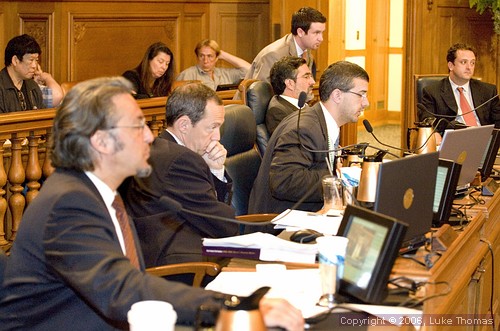
Budget and Finance Committee members, from left, Supervisors Ross
Mirkarimi,
Bevan Dufty, Chris Daly, Aaron Peskin, and Sean Elsbernd.
Photo(s) by
Luke Thomas
By Pat Murphy
June 26, 2006, 2:30 p.m.
Negotiations with business owners on mandated health care coverage
for part-time workers may be complete by the end of July, legislation
author Supervisor Tom Ammiano said today.
Ammiano made the remarks following an 8:00 a.m. public hearing
on the Worker Health Care Security Act before the Budget and Finance
Committee of the San Francisco Board of Supervisors.
"There will be more hearings," Ammiano stated. The
next committee hearing on the measure is scheduled July 5.
Although a veto-proof majority of the board already appears certain,
the District 9 supervisor said he wants to continue negotiations
to broaden stakeholder backing as much as possible.
"I think in good faith you like to get as many people on
board as possible," Ammiano told the Sentinel.
"This has been a group effort.
"You know you'll never have 100% agreement especially here
in San Francisco but I think we've been deliberate about going
step by step to see if we can capture as many as possible the
way we see it then all the better.
"If it does reduce possibilities for tension later all the
better."
Funds raised by the proposal are necessary for viability of the
parallel San Francisco Healthcare Access Plan (SFHAP) co-authored
last week by Ammiano and Mayor Gavin Newsom.
Tensions were high at this morning's hearing as all parties recognized
the measure as seminal legislation.
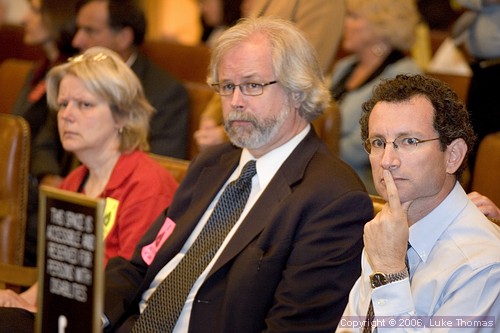
San Francisco Labor Council executive director Tim Paulson, center,
with Ken Jacobs of the Center for Labor Research and Education
at UC-Berkeley.
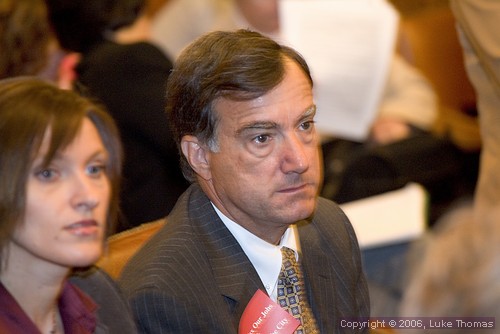
Jim Lazarus, senior vice president of Public Policy
for the San Francisco Chamber of Commerce.
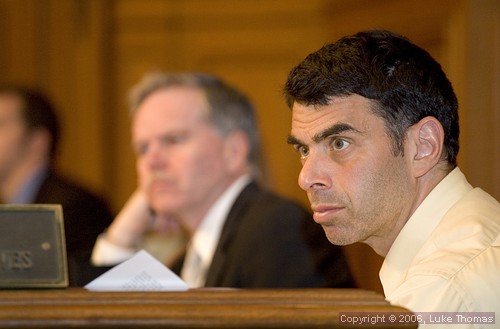
Dr. Mitch Katz, executive director of the San Francisco Department
of Health.
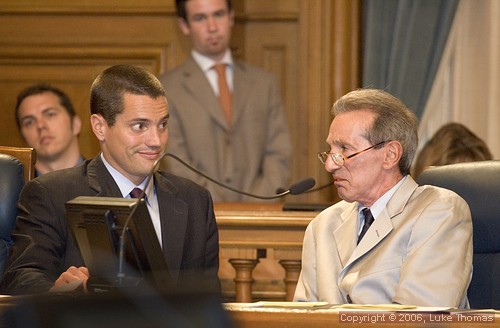
Wade Crowfoot, mayoral liaison to the Board of Supervisors,
in conversation with Supervisor Tom Ammiano.
Ammiano explained how the Worker Health Care Security Act and
the separate San Francisco Healthcare Access Plan are related.
"These plans are both joined at the hip," Ammiano told
committee members this morning.
"The Worker Health Care Security Act is not the ugly stepsister
of this wonderful concept that we are putting forth. They both
depend on each other.
"My office has been working for over a year and a half to
address the issue insuring the working poor and thanks to the
good work of the Mayor's Office Universal Health Care Council
we have a comprehensive legislative package that addresses perhaps
the most pressing issue of this day in the nation."
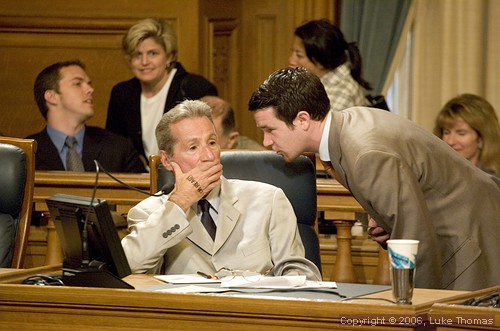
District 9 Supervisor Tom Ammiano receives briefing
from his legislative aide Zachary Tuller.
Total SFHAP costs are estimated at $198 million paid by redirecting
$104 million City funds now spent on the uninsured and $56 million
newly raised from SFHAP beneficiary co-payments.
The Worker Health Security Act would fill the remaining gap of
$28 million from mandated business owner payment for part-time
employee health insurance coverage.
SFHAP is not health insurance as it may only be used in San Francisco.
The Worker Health Security Act would cover some 16,000 part-time
workers with health insurance access.
Currently 82,000 residents and workers are eligible for SFHAP.
A spokesman for the Labor Council asked for both measures to
be merged into one proposal.
"We really urge you to look at both these pieces of legislation
closely and I would like to put on record right now that we would
like to be able to put both these pieces of legislation together
as one piece," requested Tim Paulson, executive director
of the Labor Council.
"Those of us who were on the Universal Health Care Council
that the mayor appointed as well as those of us who have been
pushing for Supervisor Ammiano's legislation know that these things
cannot work unless they are completely blended together - the
funding mechanism as well as the Department of Public Health reorganization
that is going to allow this historic access for all San Franciscans."
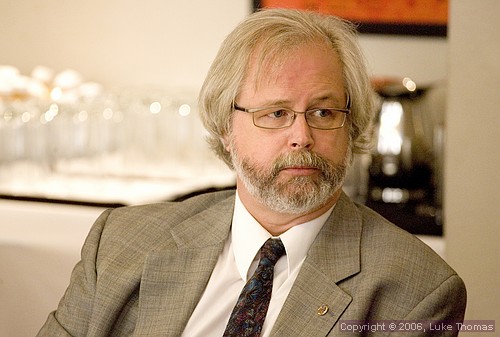
Tim Paulson at the Universal Health Care Council meeting last
week.
A spokesman for business interests asked that both proposals
be put on hold until cost to business owners is mitigated. The
City Controller estimated 500 jobs would be lost citywide as a
result of layoffs, and some speakers reported the Worker Health
Security Act would force their businesses to close.
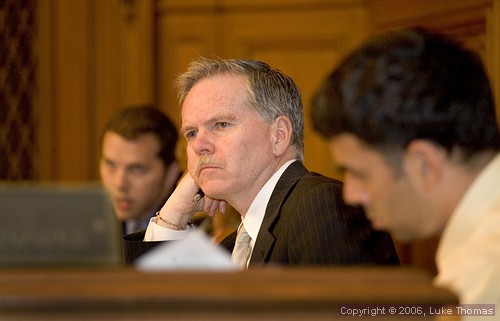
City Controller Ed Harrington
"What I am suggesting... is that the Ammiano plan is only
one potential funding mechanism," Nathan Nayman, executive
director of the San Francisco Committee on Jobs suggested.
"Perhaps we should both plans on hiatus and let's come up
with another funding mechanism. We've expressed to you that there
are other ways to do this, not just one way," he told the
committee.
"It doesn't have to be per hour mandate based upon after
the first two hours of working," Nayman later told the Sentinel.
"It can be funded through registration fees.
"It can be funded in a host of way and actually what I would
suggest is that we do an audit of the $1.5 billion Health Department.
"It was said earlier today we can get the program started
with the $104 million we have right now. Why should we be taxing
others?
"I think that from the information we heard today from the
Controller's
Office any good policy maker would take that information to
heart and would pause before going ahead and imposing the tax
on people."
Some small business owners despair of their needs being heard,
said a member of the San Francisco Small Business Commission.
"There's a lot of things that I'd like to say but I've realized
through this process that they're irrelevant," said Commissioner
Michael O'Connor who participated on the UHC.
"Our perspective has not been a part of this process.
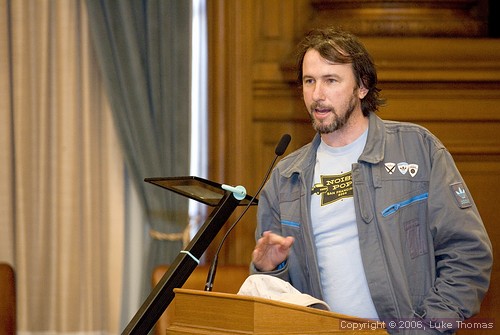
Small Business Commissioner Michael O'Connor
"We're not going to be listened to. Everything's been done.
Before the Health Access Council was started everything was done.
"There has been no process and that's firm how I feel,"
O'Connor said to applause. The audience appeared split 60-40%
with pro-Ammiano legislation sentiment predominating.
One health care proponent countered that part-time job loss could
be minimized by price hikes San Franciscans would be willing to
pay in order to receive health care access.
"San Franciscans are good hearted enough that we won't mind
paying a couple of extra bucks," said Susan Cieutat of Health
Care For All.
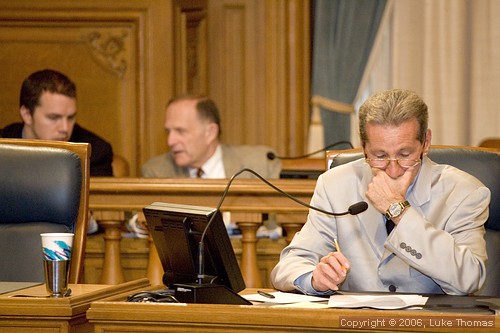
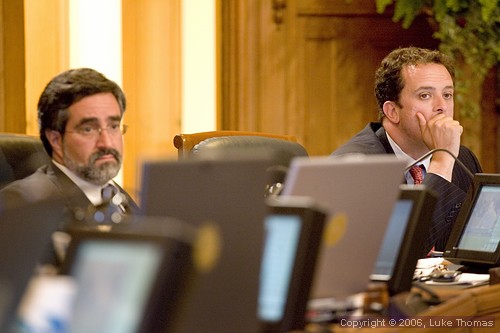
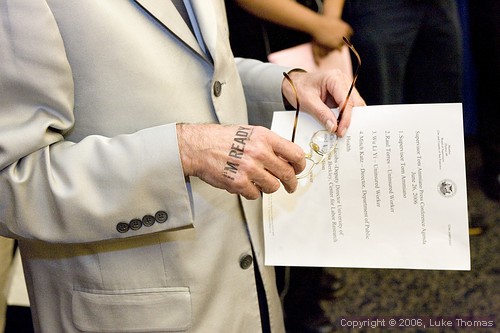
####
|